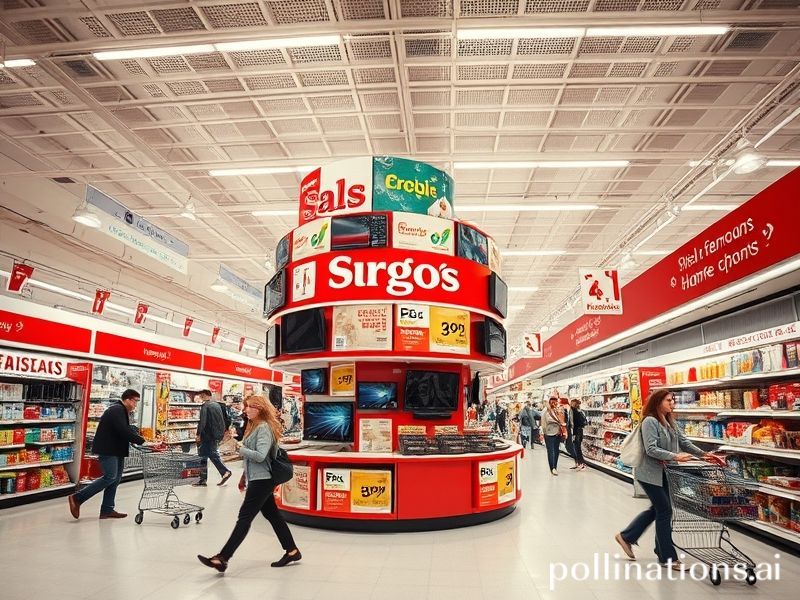Global Clearance: How Britain’s Argos Sale Became the World’s Retail Requiem
**The Great British Clear-Out: How Sainsbury’s Argos Sale Became a Global Metaphor for Our Declining Civilization**
*From our international desk, where we watch the world burn one clearance rack at a time*
LONDON—While the BBC breathlessly covers cabinet reshuffles and the Guardian agonizes over Brexit’s latest plot twist, Britain’s retail bellwether has delivered what might be the most honest assessment of our collective future: a massive clearance sale. Sainsbury’s decision to slash prices at Argos—its catalogue-shopping relic turned Amazon-speedbump—has sent shoppers scrambling for discounted toasters and marked-down fitness equipment, unaware they’re participating in a global ritual of late-stage capitalism’s decline.
The sale, which sees everything from electronics to furniture reduced faster than the pound’s purchasing power, arrives at a moment when the world desperately needs metaphors. And what better metaphor than Britons queueing for bargain kettles while their political system performs an elaborate suicide dance? From Beijing to Buenos Aires, observers recognize the pattern: the everything-must-go phase that precedes either renewal or collapse—historians remain divided on which, though they’re united in their caffeine consumption.
International analysts, those professional worriers who get paid to state the obvious with charts, note that retail sales events have become our era’s bread and circuses. Only now, the bread is gluten-free and costs extra, while the circuses stream on platforms that harvest your data faster than you can say “terms and conditions apply.” The Argos clearance joins a distinguished global tradition: America’s Black Friday stampedes, China’s Singles Day orgy of consumption, and Japan’s fukubukuro lucky bags—each a national character study disguised as shopping.
“This is what the end of empire looks like,” explains Dr. Margaret Thornfield, who studies declining civilizations between therapy sessions. “Not with a bang, but with a half-price espresso machine and a loyalty card that still gives you points toward your next unnecessary purchase.” Her research suggests that societies in decline often experience a phenomenon called “retail therapy displacement,” where citizens substitute political agency with consumer agency—choosing between discounted vacuum cleaners instead of choosing between functional governments.
The international implications ripple outward like a stone dropped in increasingly polluted water. European markets tremble at the thought of British consumers too broke to buy imports. Asian manufacturers recalibrate their production schedules, wondering if they should pivot from making electric scooters to manufacturing whatever comes next—probably canned goods and cricket bats for the coming dark ages. American retailers watch with the casual interest of someone observing a neighbor’s house fire while checking their own smoke detectors.
Meanwhile, in developing nations where “Argos sale” translates roughly to “rich people problems,” citizens follow the spectacle with the same detached amusement Westerners reserve for reality TV shows about hoarders. They’ve seen this movie before—wealthy nations discovering that infinite growth on a finite planet was always more mathematical hallucination than economic policy. The difference is they’re not surprised; they’ve been living through their own everything-must-go moments for decades, only theirs involved actual necessities like water and arable land.
The genius of the Sainsbury’s Argos sale lies in its timing, arriving precisely when Britons need distraction from inflation rates that read like cricket scores and political leadership that resembles a Monty Python sketch minus the intelligent writing. It’s retail as sedative, consumption as coping mechanism, the commercial equivalent of “keep calm and carry on”—only now it’s “keep shopping and pretend this is sustainable.”
As the clearance enters its final days, with stragglers picking through remaining merchandise like archaeologists of their own civilization, one thing becomes clear: we’re all shopping at Argos now, whether we know it or not. The entire global economy has become one vast clearance sale, liquidating the future at markdown prices, complete with convenient click-and-collect options for those too busy to face the collapse in person.
The sale ends Sunday. Everything must go. Including, perhaps, the illusion that this story has a happy ending.







